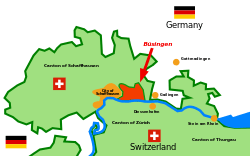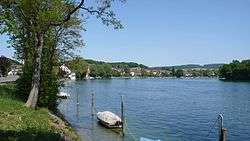Büsingen am Hochrhein
| Büsingen am Hochrhein | ||
|---|---|---|
| ||
 Büsingen am Hochrhein | ||
Location of Büsingen in the German–Swiss border area  | ||
| Coordinates: 47°41′49″N 08°41′25″E / 47.69694°N 8.69028°ECoordinates: 47°41′49″N 08°41′25″E / 47.69694°N 8.69028°E | ||
| Country | Germany | |
| State | Baden-Württemberg | |
| Admin. region | Freiburg | |
| District | Konstanz | |
| Government | ||
| • Mayor | Markus Möll | |
| Area | ||
| • Total | 7.62 km2 (2.94 sq mi) | |
| Elevation | 395 m (1,296 ft) | |
| Population (2015-12-31)[1] | ||
| • Total | 1,358 | |
| • Density | 180/km2 (460/sq mi) | |
| Time zone | CET/CEST (UTC+1/+2) | |
| Postal codes | D-78266; CH-8238 | |
| Dialling codes | 07734 (D); 052 (CH) | |
| Vehicle registration | BÜS | |
| Website |
www.buesingen.de www.buesingen.ch | |

Büsingen am Hochrhein ("Buesingen on the High Rhine"), commonly known as Büsingen, is a German town (7.62 km2 or 2.94 sq mi) entirely surrounded by the Swiss canton of Schaffhausen and, south across the High Rhine, by the Swiss cantons of Zürich and Thurgau. It has a population of about 1,450 inhabitants. Since the early 19th century, the town has been separated from the rest of Germany by a narrow strip of land (at its narrowest, about 700 m wide) containing the Swiss village of Dörflingen.
Administratively, Büsingen is part of Germany, forming part of the district of Konstanz, in the Bundesland of Baden-Württemberg, but economically, it forms part of the Swiss customs area, as do the independent principality of Liechtenstein and the Italian town of Campione d'Italia. There are no border controls between Switzerland and Büsingen or the rest of Germany since Switzerland joined the Schengen Area in 2008/09.
Büsingen is highly regarded as a holiday destination in summer by both German and Swiss visitors from around the area for its recreational areas along the Rhine. The town is also the home of the European Nazarene College, a relatively large and internationally oriented Bible college.
Special regulations between Büsingen/Germany and Switzerland

According to article 31 ZK, Büsingen is not part of the customs territory of the European Union. Although Büsingen is otherwise a German town, because it belongs to the Swiss customs territory, EU economic regulations (other than those covered by Swiss–EU treaties) do not apply.
Currency
Büsingen is the only German town in which people mostly pay with Swiss francs, although technically the euro is legal tender as throughout Germany. Until the late 1980s, the Deutsche Mark was not accepted in Büsingen. Even the Büsingen post office only accepted Swiss francs for paying for German stamps. An amendment forced the Büsingen people to accept the Deutsche Mark and later the euro. But today, Swiss francs are still more popular, since most of the inhabitants work in Switzerland and are paid in Swiss francs.
State treaty
On 9 September 1957, a conference between Switzerland and Germany was held in Locarno, with the target to regulate jurisdictions of both countries in Büsingen. A treaty was signed on 23 November 1964 and came into effect on 4 October 1967.[2]
According to that treaty, the cantonal police of Schaffhausen are allowed to arrest people by themselves in Büsingen area, and bring them to Switzerland. The number of Swiss policemen is limited to 10 at the same time, the number of German police officers to three per 100 inhabitants. The Swiss police hold jurisdiction in sectors in which Swiss law is used. Otherwise, the German police are responsible.
German police officers traveling to Büsingen must use designated routes, and refrain from all official acts while they are in Switzerland.
School
Büsingen has a Kindergarten, the current building of which opened in 1987. By 1988, however, it was overcrowded, so the building was extended.[3] Children attend primary school in Büsingen, and subsequently their parents may choose either a Swiss school or a German school for their secondary education.[4]
The European Nazarene College and Seminary of the Nazarene Church is a private school which awards degrees up to Bachelor of Arts.[4] The residential programme at Büsingen was discontinued in 2011. Instead people studying to be ministers attend regional centres in 17 places in Europe.[5]
Post and telecommunications
There is a German post office in Büsingen; Büsingen has two postal codes, one Swiss and one German. To send a letter to Büsingen, one may address it to:
- 8238 Büsingen am Hochrhein
- Schweiz
or:
- 78266 Büsingen am Hochrhein
- Deutschland
Letters from Büsingen may be franked with a Swiss or a German stamp. A standard letter from Büsingen to Switzerland needs either a Swiss stamp worth 85 Rappen or a German one worth 62 euro cents (approximately 74 Rappen). Outside of the post office, there are Deutsche Telekom and Swisscom phone booths.
Similarly, residents of Büsingen can be reached by telephone using either a German number (with the prefix +49 7734) or a Swiss one (with the prefix +41 52).
Vehicle registration
For customs reasons, Büsingen has its own licence plate (BÜS), even though it is part of Constance district which has the "KN" sign. These special licence plates were created to simplify the job of the Swiss customs officers. Only vehicles with BÜS licence plates are treated as Swiss vehicles.
There are very few BÜS licence plates. The letters BÜS are mostly followed by an A. BÜS is the rarest licence plate still in use in Germany.
Sports
The local association football team, FC Büsingen, is the only German team to play in the Swiss Football League.
History
Long under Austrian control, the town became part of the German kingdom of Württemberg under the 1805 Peace of Pressburg agreement during the Napoleonic Wars.[6]
In 1918 after the First World War, a referendum was held in Büsingen in which 96% of voters chose to become part of Switzerland. However, it never happened as Switzerland could not offer anything suitable in exchange, and consequently Büsingen has remained an exclave of Germany ever since. Later attempts were rejected by Switzerland.
The exclave of Büsingen was formally defined in 1967 through negotiations between West Germany and Switzerland. At the same time, the West German exclave of Verenahof, consisting of just three houses and fewer than a dozen people, became part of Switzerland.
Government and infrastructure
Residents call the town hall "the glass palace".[7]
Geography
Büsingen has 7.62 square kilometres (2.94 sq mi) of area, four times larger than Monaco. Its boundary with Switzerland is 17.141 kilometres (10.651 mi) long and is marked by 123 stones. One named stone, the Hattinger Stone, marks the Büsingen-Dörflingen boundary. It, along with several other points, is in the Rhine River.[7]
See also
- Expansion of Switzerland
- Baarle-Hertog
- Baarle-Nassau
- Campione d'Italia
- Llívia
- Jungholz
- Kleinwalsertal
- Verenahof
References
- ↑ "Gemeinden in Deutschland nach Fläche, Bevölkerung und Postleitzahl am 30.09.2016". Statistisches Bundesamt (in German). 2016.
- ↑ Statement of Treaties and International Agreements Registered Or Filed and Recorded with the Secretariat During the Month of April 2005. New York: United Nations Publications. 2005. p. 80.
- ↑ "Our children in the new bigger kindergarten." (Archive) Büsingen am Hochrhein. Retrieved on 14 November 2013.
- 1 2 "Schools and training centers." (Archive) Büsingen am Hochrhein. Retrieved on 14 November 2013.
- ↑ "Busingen’s «Bible College» – what it is and what it does." (Archive) Büsingen am Hochrhein. Retrieved on 14 November 2013.
- ↑ Frank Jacobs (15 May 2012). "Enclave-Hunting in Switzerland". The New York Times.
- 1 2 "The municipal administration of Buesingen: Facts and information." (Archive) Büsingen am Hochrhein. Retrieved on 14 November 2013.
External links
| Wikimedia Commons has media related to Büsingen am Hochrhein. |
- Büsingen Official Website
- (in German) Büsingen Official Website
- Jan S. Krogh's GeoSite on Büsingen
- Büsingen am Hochrhein (German Wikipedia)
